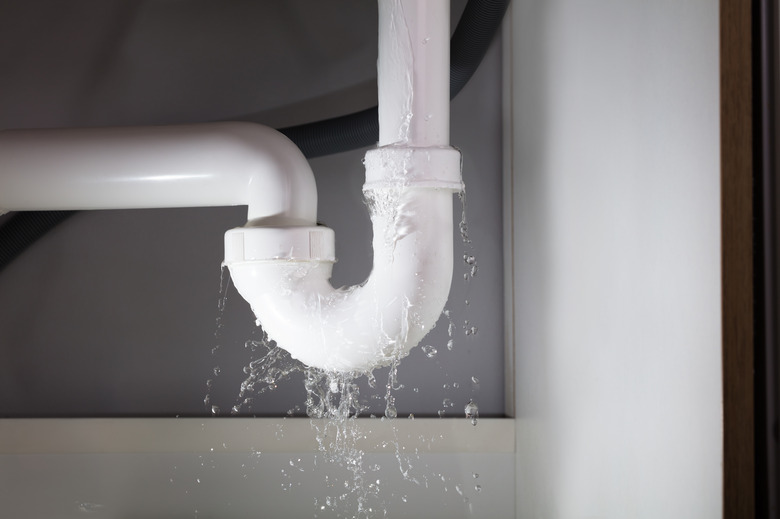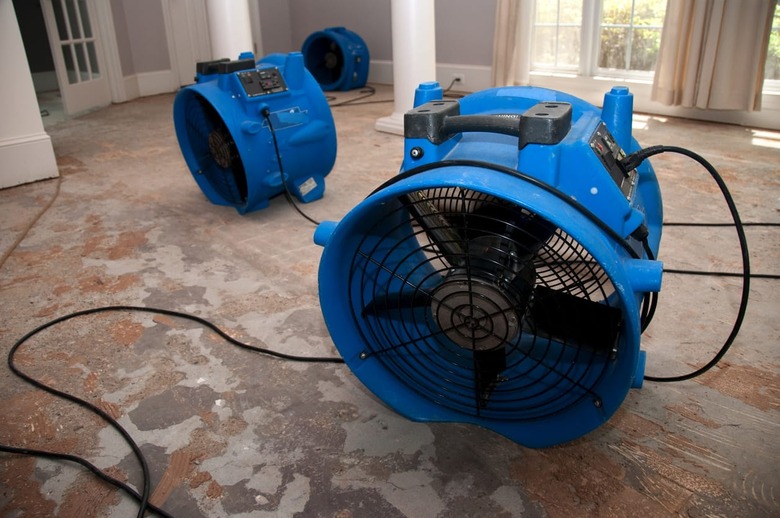What To Do If Your House Floods
While the causes of climate change are the subject of political debate, few people will dispute that recent years have seen increasing numbers of people dealing with home flooding caused by a variety of weather events. In 2019, the central United States suffered heavy flooding due to an unusual amount of winter rain, and flooding remains a fact of life for Americans in southern coastal communities and other low-lying areas during the hurricane season. It can also be an annual danger in spring for many people who live along the thousands of miles of rivers and streams that form the continent's watershed drainage basins.
Nature isn't responsible for all floods. Sometimes, it's a plumbing leak. Whatever the cause, the accumulation of water creates a number of dangerous situations. The water is usually unsanitary and, during a natural disaster, it's often filled with pathogens and even small animals, such as snakes and rats. Dirty water conducts electricity, and any exposed connection in the wiring can turn a flooded house into a shock hazard.
Whether it is caused by nature or a failure of a home's mechanical systems, a homeowner's response in the immediate aftermath of a flood can literally be a life-or-death affair, but even if things aren't that serious, appropriate action mitigates against further damage and expedites the rebuilding process. Here are some key recommendations for appropriate action in the aftermath of a flood from FEMA, the Red Cross and other authorities.
Seek Higher Ground
Seek Higher Ground
In the event of a tsunami or a flash flood, the advice to seek higher ground makes eminent sense, but you should follow it even in a minor disaster, such as a flood in the basement from a septic backup. There are two good reasons:
- The water is probably polluted. Water that comes from broken plumbing pipes may contain sewage, and water that comes from outside often carries vermin.
- Dirty water can conduct electricity. When a flood occurs, there is often damage to electrical systems, and any exposed wire that contacts the water energizes it. If you walk through the water, your body provides a ground path, and electricity could pass through your heart and stop it.
"Higher ground" is a relative term. In a basement flooding, higher ground may be the upper floors of your house, but in a major flood, you may need to seek higher ground in a neighbor's house, on the roof of your own house or someplace completely out of the neighborhood.
Shut Off Gas and Electricity
Shut Off Gas and Electricity
If a flood occurs in the basement or any other room in the house, switch off the circuit breakers in the main service panel that control circuits in that area. When a flood affects the entire house, you should shut off the main breaker for the panel as well as all the branch circuit breakers. Do this even if the power has gone out to ensure that no one gets shocked if the power is suddenly restored. Do not attempt to access the panel or shut off any circuits if you can not do it safely, without the risk of shock.
You should also locate the main gas supply valve, and if you can access it, turn it off. That prevents gas that could seep from ruptured pipes from collecting inside the house and creating an explosion hazard.
Tip
You may need an adjustable wrench to turn the nut on the gas valve. Prepare for a disaster by including a wrench with your emergency supplies.
Call 911 and Hang On
Call 911 and Hang On
Once you're sure everyone in your family is safe, at least for the moment, call 911 to alert the authorities. If you're stuck in the upper floors of your house, wait for responders come to help you evacuate. Don't try swimming or walking away, and don't try to drive your car. Floodwaters often have powerful currents that can sweep you away; a 1-foot surge can have enough power to overturn your car.
Returning to Your Home
Returning to Your Home
The recovery process after a major flood is a long and expensive one, and you'll need to file a claim with your insurer, so call the company as soon as possible. If you're a renter, call your landlord as soon as it is practicable to do so.
- Salvage personal items. Not everything will be worth saving, but the sooner you get items you do want to save out of the water and to a dry place, the better the chances of recovering them. Even some solid-wood furniture pieces can be salvaged if you get them into dry conditions fast enough.
- Take pictures. Your claim will be expedited if you have pictures to document the damage. Take as many pictures as you can, as soon as you can, and make sure the date tags are enabled on the camera you use. Once you have this documentation, you need to take steps to secure your house and prevent any more damage from occurring.
- Remove water so things can dry out. The faster you can pump water out of the house, the less chance there is of water-logging, mold growth and warping. Use a sump pump for general pumping and a shop vac or a bucket for removing water from small areas.
- Restore utilities when all the water is gone. Even if you can't stay in the house, you'll need light to continue the cleanup process, and you'll need electricity to power fans to speed up the drying process.
- Disinfect to prevent mold growth. Mold is a huge problem after a flood, and you won't be able to clean all of it immediately. However, you can get a quick upper hand by spraying active mold with a 10 percent bleach solution, which is 1 part bleach to 10 parts water. Suspect mold on any wall that appears discolored or smells musty.
Tip
The actual job of mold remediation involves physical scrubbing with detergent and water, and you may need professional help for that. Disinfecting right after a flood can limit mold growth and make the remediation job easier and less costly.

